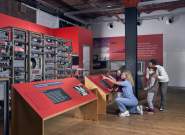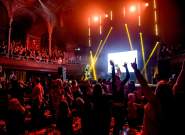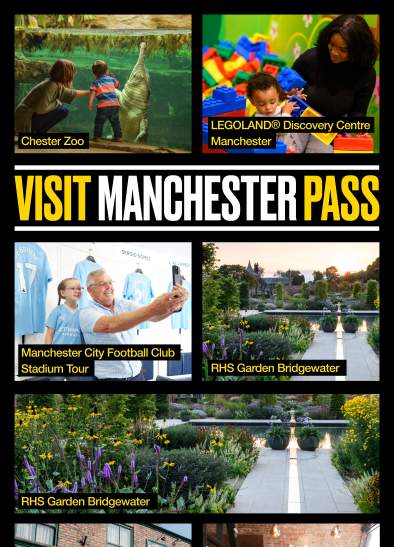By Emily Oldfield
The dark certainly matters to Nick Dunn. He’s the Salford-born author of Dark Matters: A Manifesto for the Nocturnal City, a book which considers what can be learned from urban space at night – informed by his regular practice of Night-Walking; often adventuring across the cityscape when darkness has fallen.

No stranger to the nocturnal side to Salford and Manchester – including its underground culture, having been in the early 2000s band The Obsession – Nick will be part of the panel at Following Hauntology: twilight streets and dark horizons presented by HAUNT Manchester and Not Quite Light on the 27th March. He was formerly Principal Lecturer at Manchester School of Architecture, and now is Executive Director of ImaginationLancaster (a research lab for exploratory design) where he is Professor of Urban Design.
The past leaking into the present, the sense of ‘haunted’ space and implications for what is yet to come – all of these are aspects explored in Nick’s work on cities and urbanism, especially in his role also as Associate Director of the Institute for Social Futures. Considering the cityscape as a series of flows, systems and processes is part of his forward-thinking approach; throwing open new possibilities for considering urban environments and our place within them.
From pushing the boundaries of understanding the city, to talking about ‘The Smart City’, ‘Nightscapes: On Wandering, Deviancy and Creativity’, ‘The Future of the Future’ and plenty more, Nick provides an eye-opening perspective into the way we see the cityscape. HAUNT Manchester decided to speak to him to find out more…
Hello Nick. Why do you think an event discussing hauntology is important and what does it mean to you to be involved?
“Hello Emily, this is a good opening question! I think because we live in a world in which many different things appear more uncertain than perhaps they did in previous eras, though this might be the convenient tidying up that hindsight provides, and our relationship with time is much more complicated than it used to be. This is particularly evident in culture and technology. On the one hand, various forms of culture: architecture, design, fashion, music, performance, have folded back on themselves in terms of time. What we might think of as ‘feedback loops’ of creative ideas appear to be getting shorter.
“On the other hand, digital technologies have accelerated us to a point where we expect instantaneous responses from one another as well as being able to access many different forms of culture and experience, albeit mediated, immediately at the touch of our screens. Whilst there are many wonderful benefits to this, there are also things that slip between the cracks – those books that are never digitised, that music that is not found on streaming platforms, films that have never been reissued etc.
“Plus, being always ‘on’ and networked comes with a different kind of cost as it is reshaping the way our brains work and how we think. Rather than opening up the future as an expansive space for greater diversity and possibility, in many ways these processes offer a range of ideas about the future that exist in a fairly narrow bandwidth. For me, being involved in an event about hauntology is a great opportunity to listen to others and have a dialogue about what happens when we think about the future, and more importantly - who is it for.”
.jpg)
You are Executive Director of ImaginationLancaster and focus often on cityscapes. What can hauntology add to the understanding of and interaction with a city and why is it important?
“The work we do at ImaginationLancaster is future-focused but more specifically I am interested in how hauntology can help us understand ‘lost futures’. Understanding the future as a partly broken space that already exists in the present enables us to question existing conventions in the world and explore what might happen if we lived differently. Key to this is the everyday experience and our encounter of it.
“Much of my own work concerns cities because these are the places where many aspects and dimensions of life come together, sometimes in a choreographed way but more often than not in an incoherent manner with various tensions, inconsistences, and competing interests. Hauntology is a useful way to frame our experiences with cityscapes as is provides a more expansive way to describe our encounters. It also enables us to tell stories about cities beyond the material facts of them, the unusual, the eerie, and the uncanny moments that are not always easily accounted for. This is important because cities should be a shared resource, rich with diversity, plurality, and equality. The more ways we can articulate different voices and share our stories, the better our places become.”
You were involved in ‘Shadow Play: Liberation and Exhilaration in the Mancunian Night’. Why do you think that exploring cities at night can be beneficial and why Manchester in particular?
“Yes, I was delighted to be part of the Loitering with Intent exhibition at the People’s History Museum a few years ago. I am particularly interested in cities at night because unlike cities in the daytime they somehow seem less fixed and predetermined. Night time often feels like a time and space for possibility, it feels unwritten in some way.
“I was born in Salford and aside from brief forays in other countries have lived in Manchester all my life. I have been nightwalking regularly for about six years now. It began as a response to personal trauma and an inability to sleep. What I think is especially beneficial about exploring cities at night is that our vision becomes less dominant and reliable than in the daytime, we have a much more multi-sensory experience of places at night, what we hear, smell, touch and taste become more significant and integrated.
“Cities at night are the partly broken future I mentioned earlier. There are enough elements to define a place, but it also feels unfinished and open to reinterpretation. In my book Dark Matters (Zero, 2016) I sought to explore Manchester and Salford through a series of nightwalks to convey to the reader what I was experiencing and how special it can be. Clearly this is a very personal and particular view, but I do believe that at night the streets become supernatural, even magical. That is not to say I think they are full of ghosts in the literal sense but certainly the presence of the past feels more palpable at night, it seems to leak out of the city’s pores at night amidst the shadows. This otherworldliness is critical if we are to have places where we can be creative and reimagine the world and how we might collectively live in it in the future.”
.jpg)
Why do you think it is significant that this hauntology event is being held in Manchester?
“Manchester has a rich historical warp and weft of narratives, counter-histories, and cultures. Being the birthplace of so many different political movements, scientific discoveries, cultural forces, and influential figures, it rightly lays claim as an important place. However, it also is a city of latent energies, more clandestine histories, and secrets. Outside of the powerful narratives the city tells about itself are alternative readings and stories that I would suggest are equally significant. This hauntology event is one way to uncover and share some of those less familiar accounts and discuss them. It enables us to stir the melting pot of the city and allow other things to come to the surface for a change.”
Many people do not believe in ‘ghosts’ – so can they still engage with hauntology, especially in relation to the city?
“Yes of course. I don’t think you need to believe in ghosts to engage with hauntology, at least not in the conventional sense of apparitions. My view on hauntology chimes with other writers such as Mark Fisher or Simon Reynolds where it provides a way for us to explore lost futures that for whatever reason did not happen.
“Most cities are built in a piecemeal fashion over relatively long periods of time and Manchester is no exception. If you live and/or work in the city or near it, then you are likely to have an interest in how it changes and the dynamics of urban life. Understanding that the future is not written and how the past can echo back to us in the present is a valuable way to open up a discussion about the place we collectively call home. As for strange figures moving across the city at night, if you happen to see a cloaked spectre in your neighbourhood please say hello - there is a good chance it is me and less mysterious than you think!”

Nick Dunn’s book Dark Matters: A Manifesto for the Nocturnal City is published by Zero Books and you can find out more here.
Profile image and photographs of Manchester Cathedral, Castlefield and The Mancunian Way thanks to Nick Dunn







